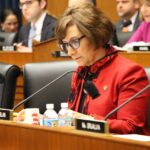Rep. Suzanne Bonamici joins fellow lawmakers to reintroduce an act to make childcare more accessible.
Before Democrats took control of both chambers of Congress and the presidency, Suzanne Bonamici, a Democrat who represents Oregon’s 1st congressional district, made the state’s childcare crisis her priority.
In September 2020, she created the Oregon Child Care Advisory Board, a group made up of 12 members, which was selected to advise her on childcare issues and how federal legislation could be used to support children and working parents.
Now Democrats control both chambers of Congress and the White House. After a flurry of bills to jump-start the economy after COVID-19, including the $1.9 trillion American Rescue Plan, Democratic lawmakers see an opportunity to move forward with childcare legislation.
RELATED STORY: Pandemic Accelerates Child Care Solutions
On March 16, Bonamici and New York Rep. Jamaal Bowman reintroduced Massachusetts Democrat Katherine Clark’s Child Care is Infrastructure Act. The legislation establishes loan and grant programs for childcare facilities and early childhood educators to stem the childcare crisis in Oregon and around the country.
This interview has been edited for length and clarity.
How does the Child Care is Infrastructure Act support Oregon business?
All 36 counties in Oregon are considered to be childcare deserts for infants and toddlers, meaning there is only one slot available for every three kids who need it. This issue affects every part of our economy, including low-income workers, essential workers and single parents.
We had a hearing on university research recently, and one of the top issues that came up was the researchers saying: “We can’t do this work because we don’t have childcare.”
What the Child Care is Infrastructure Act does is recognize the importance of childcare for our families and our economy. It invests in facilities and providers, establishes grant programs to improve state facilities and establishes a higher education loan repayment program for early childhood educators, which is also very critical. It also funds campus childcare to support student parents.
If we invest in kids today, it pays for itself multiple times over because they enter the school system ready to learn. Families aren’t missing as much work and we spend less on social safety net services if families are being supported that way.
Another thing we got in there was the child tax credit with a refundable tax credit of $1,600 per child. We have also been able to secure critical funding for Head Start, which will help families gain access to childcare. This has been estimated to cut poverty in half.
In Oregon this credit will go to the families of 700,000 children. On top of that, we have economic impact payments, which will go to 2.7 million adults and more than 970,000 children in Oregon. The state is going to receive $400 million through the childcare development block grant program. The dollars we are spending are going right back into our communities.
Once the pandemic dies down, won’t the laws of supply and demand fix the childcare issue?
Access to childcare is an issue that has been exacerbated by the pandemic not created by the pandemic. It is not something there is necessarily a market solution for because you can’t raise the tuition to pay the providers since families are already paying as much as they can.
You can’t lower tuition because these providers are often already making poverty wages. Providers who work at some of the larger places have college degrees and student loans.
One parent I spoke to said: “For any working family, childcare is one of our basic needs. If it crumbles or gets even a fraction more difficult to find, our collective ability to work crumbles too.”
It predominantly affects women. Often women of color are more likely to be childcare providers, and they can’t go back to work. This is also an issue of gender and racial equality.
RELATED STORY: Child Care Providers Fear Closure
Is there any Republican support for this legislation?
Investing in childcare should not and has not been a partisan issue. There has been a recognition on both sides of the aisle that this is something important. Across the country there has been this recognition, highlighted by the pandemic, that we need to have childcare or we’re not going to be able to reopen our economy.
Student loan repayment features prominently in your plan. President Biden recently forgave $1 billion in student debt. Will this continue to be a priority in future legislation?
I spent seven years in higher education and came out of it with a very manageable amount of debt, but that’s not what I’m hearing from students now. We hear too many reports of young people struggling.
I’m grateful to see the Biden administration stand up and recognize that students who had been cheated into debt have the right to have their debt forgiven. Much of this debt comes from unscrupulous for-profit institutions that leave students with a lot of debt and not a lot of education.
We need more Pell Grants, work study and programs like TRIO, which help students afford higher education. Overall, this is an issue that we are going to be discussing for a while, but it’s important that we don’t just end up canceling debt for some while not fixing the problem of people going to college and incurring a lot of debt.
We need to make college affordable. Finances should not be a barrier to anyone who wants to go to college. We also have to look at paths for people to take other than college. We just updated the National Apprenticeship Law for the first time since the 1930s.
To subscribe to Oregon Business, click here.







